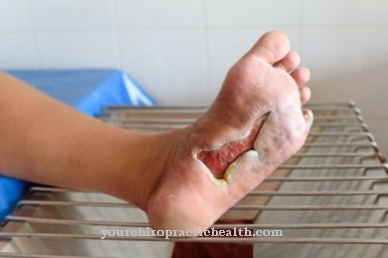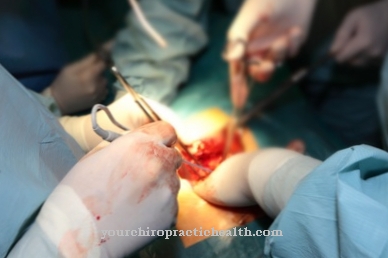Memory lapses or. Memory problems and forgetfulness are usually disorders of the memory to reproduce new or old information. In healthy people, the ability to store and remember information is possible without interference.
What is a memory disorder?

The memory disorder is known in medical terms as mnestic disorder or dysmnesia.
A distinction is made between three forms: the selective, quantitative and qualitative memory disorder. With selective memory disorder, the patient no longer remembers verbal or spatial information.
The quantitative disturbances describe a state in which the patient either remembers a lot more than usual (hypermnesia) or nothing or very little (amnesia).
The last group of memory disorders are déjà-vu or jamais-vu experiences, which are considered falsifications.
causes
A fundamental distinction is made between qualitative and quantitative memory disorders. The selective memory disorders occur mainly in temporal lobe epilepsy. Such disorders also occur in Alzheimer's disease. The patient can remember things that happened decades ago, but not current events, new faces or rooms.
The causes of the selective sphere of action are often irreversible diseases that can or must be fatal. The quantitative disturbances are subdivided and accordingly each have different causes. For example, hypermnesia is a memory disorder that can occur naturally. You can see how it went from witnesses during questioning: they often remember more at the second or third questioning than at the first questioning. This memory disorder is also used in hypnosis.
Amnesia, on the other hand, often occurs after a traumatic brain injury - it can pass again, but in particularly severe cases it is permanent. Amnesia can also result from other diseases such as migraines, meningitis or dementia.
The qualitative memory disorders have harmless causes. False memories are saved in stressful situations, for example, which can lead to a déjà vu experience. Another well-known form of such memory disorders is cryptomnesia, in which an author mistakenly but in good faith thinks that an idea came from him - he has unconsciously taken it over from another source.
You can find your medication here
➔ Medicines against memory disorders and forgetfulnessQualitative memory disorders
Content-related memory gaps and disorders are referred to as qualitative disorders. Here the gaps in memory are exchanged with inventions. Often this form of memory disorder is found in alcoholics. The medical term for this is: Confabulation. The so-called Déja vu experience denotes a false recognition. Affected people have allegedly already experienced different life situations, although this cannot in fact be. The other way round there is also the shape of the Jamais vu experience in which the patients claim to have never experienced a certain situation.Quantitative memory impairment
Here one understands a general loss of memory. This can occur in the form of gradual memory loss or even amnesia. The gradual loss of memory is typical in dementia. The short-term memory is particularly affected, while the long-term memory is affected less often. For example, those affected hardly remember what they experienced the day before, but they can describe exactly what happened 40 years ago.
Amnesia is a memory gap that only occurs for a limited time. Often, amnesia occurs after head and brain injuries such as if you have a concussion or other disturbances of consciousness. In most cases, the patients have no memory of what happened before an accident.
Diseases with this symptom
- concussion
- Creutzfeldt-Jakob disease
- Sleep apnea
- epilepsy
- Alzheimer
- ADHD
- dementia
- Brain tumor
- stroke
Complications
When describing the complication, the complete disorder should be included. A complication in medicine is the later symptom of a disorder or an undesirable side effect of a medicinal preparation when it is used against this health disorder.
Complications can therefore arise in the absence of treatment or with treatment. Memory gaps are the possible complications of natural age, which can lead to real dementia. Similarly, blackouts may provoke further complications. Memory gaps are caused by deposits in the brain, which are often triggered by arterial constrictions. Complications are especially common in debilitated people. In severe cases, narrowing arteries can be life threatening. Memory lapses can be a harbinger of this. In order to prevent dangerous complications, a clinical examination should be made after the appearance of suspicious symptoms.
If necessary, the sick person must be treated as an inpatient in order to eliminate later complications such as pathological memory lapses. A plan can be made here for the following outpatient therapy against memory lapses and the underlying health disorder. Memory lapses, on the other hand, are just one complication that occurs in dementia. The healthy lifestyle, the avoidance of fatty foods and nicotine, and regular health checkups can avoid memory lapses. At times a low-sugar diet is advisable. Some medicinal preparations are stressful for the brain and can therefore not be used here.
When should you go to the doctor?
Memory gaps are not to be rated as pathological. Forgetfulness does not automatically mean imminent dementia or Alzheimer's disease. Even in old age, memory lapses are not necessarily an alarm signal. Affected persons should first consider a possible explanatory connection with their own memory gaps or the memory gaps of other people. Memory gaps often occur in stressful situations, as if the brain were defending itself against too many details at once. A poor sense of spatial orientation and poor memory for faces are also innate and can occasionally act as memory gaps.
However, a doctor should be consulted in the event of memory loss if there is a suspicion of dementia or Alzheimer's disease. This is the case when a person can hardly or no longer organize their everyday life due to a strong forgetfulness and possibly even puts themselves and others in danger. She has problems dressing and undressing, preparing food and constantly relocating objects that are often found in unusual places afterwards.
Memory lapses after a head injury, migraines, fainting or after a state of shock are also reasons to urgently consult a doctor. Taking certain medications can also cause memory loss. Unless there are stressful situations or short-term memory lapses, as everyone knows, a doctor should be consulted in the event of memory lapses, even if only as a precaution.
Doctors & therapists in your area
Treatment & Therapy

For known diseases such as epilepsy, drugs are prescribed to prevent the seizures. In this way, memory disorders no longer occur. For incurable diseases like Alzheimer's, at least preventive drugs are prescribed to relieve the condition and delay the progression of the disease.
For other memory disorders such as amnesia, the only thing that helps is to wait for the memory to return. In the meantime, the other symptoms and signs that caused the condition are usually treated.
Outlook & forecast
As a rule, memory lapses are only accompanying symptoms of another illness. If they happen suddenly, a doctor should be seen as this may be another serious problem. The further course of this disease depends heavily on the severity of the memory gaps and their origin. If there are only small gaps and memory disorders, it is quite possible that these appear only temporarily and disappear again after a short time.
Memory lapses often occur in old age and are perfectly normal. They often turn into dementia in old age. Unfortunately, this disease cannot be treated directly. The affected person is then dependent on the care and help of other people. Memory gaps can also be the harbinger of arterial narrowing and should be investigated more closely, especially in weak people.
Memory gaps can be limited by eating a healthy diet and avoiding nicotine. However, they are not reversible. Without treatment it can therefore happen that a person can no longer cope with everyday life on their own due to the memory gap.
If the memory loss occurs after an accident or an injury to the head, a doctor must be consulted urgently.This can lead to epileptic seizures if these disorders are not treated in good time.
You can find your medication here
➔ Medicines against memory disorders and forgetfulnessprevention
Memory disorders caused by illnesses can only be prevented by strictly adhering to the prescribed medication. It is easier to protect yourself from memory disorders that occur naturally.
Everyone has to develop their own, individual strategy to memorize things better. This can help against typical age-related memory disorders. It is important to be clear about the sources, especially when doing scientific work.
Lists, mind maps or other techniques are helpful, for example, which should help to memorize facts more precisely and to look up them again later if necessary.
You can do that yourself
The success in the treatment of memory lapses depends very much on the physical and psychological state of the person concerned. As a rule, the memory lapses mainly occur in old age and cannot be completely avoided. Memory gaps affect different people to different degrees. However, there are also diseases that cause memory lapses, such as Alzheimer's. Unfortunately, these diseases cannot be treated. The patient has to live with memory gaps and is often dependent on outside help.
If the memory lapses appear in the younger years, then educational games and mind games can fix the memory gaps. Targeted training often leads to success. Medicines are typically not used in the treatment of memory lapses. To prevent memory gaps, people should train their memory specifically. This is possible with books and with various games on the computer. Older people can also make use of these options.
If the memory lapses occur after an accident or a blow to the head, a doctor must be called in. This can be a trauma that triggers the memory loss. These symptoms can only be treated to a limited extent and the success of the treatment depends heavily on the patient's condition.













.jpg)

.jpg)
.jpg)











.jpg)